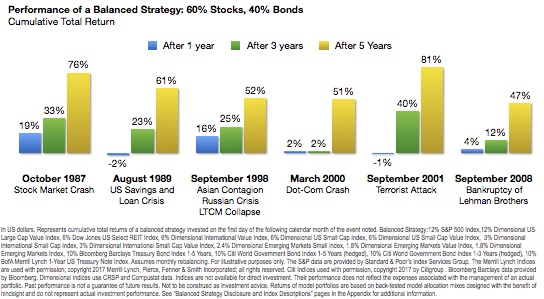The Market’s Resiliency
Discipline is an integral element to successful investing. However, even the most stalwart investors can be shaken when a clear crisis has hit. Fortunately, the market has a stronger resolve.
The chart above shows performance of a balanced investment strategy following a few historical crises. The subsequent one-, three-, and five-year annualized returns start from the first day of the month following each crisis.
Although a global investment strategy would have suffered losses immediately following most events, the financial markets recovered over time, as indicated by the positive three- and five-year cumulative returns.
Negative events such as these may tempt investors to flee the financial markets. But diversification and a long-term perspective can help investors apply discipline to ride out the storm.

Investors Need Discipline
The most common approach to growing wealth in the market is based on prediction and forecasting. Methods include picking stocks expected to perform well in the future, moving in and out of industry sectors, or attempting to time the market.
This conventional approach assumes that someone has a crystal ball. Predicting the future of the market seems like an easy task after a crisis, but as we can see above, that’s not always the case.
Forecasting is not the key to successful investing. In fact, when people meet financial advisors or others in the investment business, their first question is typi- cally, “where do you think the market is going?” They are basically asking for a prediction. Yet, no one can know the future.
A prediction about an uncertain future is just an opinion, and it should not determine anyone’s decision. Many investors learn this the hard way.
